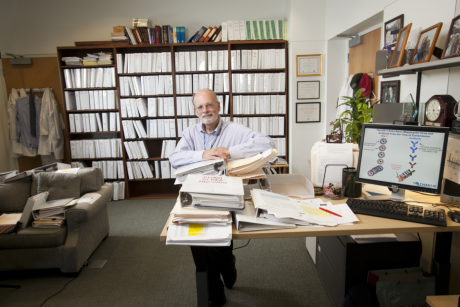
Pictured from left to right are Vivian Arinaitwe, Sophia Singer, Saajan Patel and Joseph Okileng who were members of a DukeEngage team with the NeoNest they created in Kampala, Uganda. [Photo credit: Saajan Patel]
Published July 2, 2024 under Education News
Uganda was a place that felt out of reach for Saajan Patel. The Duke 2024 graduate never lived in the country, but his family did. When his father was five, his family fled the dictatorship of Idi Amin and found refuge in England. They later moved to Cary, North Carolina, where Patel grew up.
“My dad always told me stories about the streets he’d walk in Kampala, and the boda bodas,” says Patel, who graduated with a major in biology and minors in global health and chemistry. “My entire life, I’ve wanted to explore Uganda and walk the streets that my father and grandfather did.”
As a Duke student, Patel finally got that chance. He made two trips to Uganda as part of teams working on low-cost innovations to aid in local health challenges. One of those projects, a portable infant warmer called the “NeoNest,” won first place in the 2024 Rice360 Global Health Technologies Design Competition at Rice University in Texas.
“When I told my dad I got first place, he and my mom were excited,” he says. “It made me happy, and was one of the most profound experiences I’ve had at Duke.”
The design stemmed from a research project through DukeEngage, a summer experiential learning program where students are embedded in local communities to work on projects addressing societal issues. Patel was paired with fellow Duke student Sophia Singer and Vivian Arinaitwe and Joseph Okileng, engineering students from Makerere University in Kampala.
As part of the team’s research during summer 2023, the students met with an ambulance driver at one of Kampala’s main hospitals, who told them about the challenge of transporting infants born prematurely at home to the hospital in time to receive care. As in most low- and middle-income countries, many births in Uganda take place at home. But when babies arrive prematurely, their low birth weight can lead to hypothermia. With no specialized equipment to regulate newborns’ temperatures, drivers often resort to using bags of warm water to try to keep newborns warm during the trip to the hospital.
“The driver said sometimes babies would die on the way to the hospital,” Patel recalls. “We realized they needed a solution for that problem.”
NeoNest uses insulation and electronically controlled heating pads to regulate a newborn’s temperature. It is built from locally sourced materials, including a jerry can similar to those used by locals to carry water.
In designing NeoNest, Patel was able to apply lessons from his first trip to Uganda. As a freshman, he was part of a Bass Connections team led by Tamara Fitzgerald, M.D., Ph.D., a surgeon and global health associate professor who has been working in the country for the past decade to improve access to pediatric surgeries. The project, which aimed to develop tools to make laparoscopic surgery possible in low-resource settings, became a pivotal experience for Patel.
“Watching her work and be passionate about what she does was an inspiration to me and guided my journey,” he says. “I was able to translate what I learned working on the laparoscope to the NeoNest. My ultimate goal is to be like [Dr. Fitzgerald]. I want to follow in her footsteps.”
Fitzgerald says the success of Patel and his team was “well-deserved.” While the DukeEngage team Patel worked with is engineer-focused, she says that didn’t hinder Patel’s hands-on approach with the NeoNest.
“He’s intellectually curious and always shows up while being humble,” says Fitzgerald. “He’s innovative and enthusiastic. I consider him a son.”
Patel is taking a gap year while he applies to medical school and pursues clinical research opportunities at Duke. He and his team have received grants to continue developing the NeoNest device. And that’s not the only unfinished business he has in Uganda.
“My dad said the next time I go to Uganda, he’ll come with me,” Patel says. “It makes me happy my family’s proud to revisit our history through this project."


